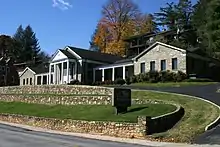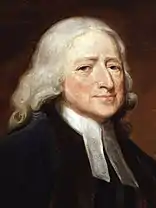The Methodism PortalMethodism, also called the Methodist movement, is a group of historically related denominations of Protestant Christianity whose origins, doctrine and practice derive from the life and teachings of John Wesley. George Whitefield and John's brother Charles Wesley were also significant early leaders in the movement. They were named Methodists for "the methodical way in which they carried out their Christian faith". Methodism originated as a revival movement within Anglicanism originating out of the Church of England in the 18th century and became a separate denomination after Wesley's death. The movement spread throughout the British Empire, the United States and beyond because of vigorous missionary work, and today has about 80 million adherents worldwide. Wesleyan theology, which is upheld by the Methodist churches, focuses on sanctification and the transforming effect of faith on the character of a Christian. Distinguishing doctrines include the new birth, assurance, imparted righteousness, the possibility of entire sanctification, and the works of piety. Scripture is considered a primary authority, but Methodists also look to Christian tradition, including the historic creeds. Most Methodists teach that Jesus Christ, the Son of God, died for all of humanity and that salvation is achievable for all. This is an Arminian doctrine, as opposed to the Calvinist position that God has pre-ordained the salvation of a select group of people. However, Whitefield and several other early leaders of the movement were considered Calvinistic Methodists and held to the Calvinist position. The movement has a wide variety of forms of worship, ranging from high church to low church in liturgical usage, in addition to tent revivals and camp meetings held at certain times of the year. Denominations that descend from the British Methodist tradition are generally less ritualistic, while American Methodism is more so, the United Methodist Church in particular. Methodism is known for its rich musical tradition, and Charles Wesley was instrumental in writing much of the hymnody of Methodism. (Full article...) Selected article
Affiliated organizations are the World Fellowship of Methodist and Uniting Churches, the Oxford-Institute of Methodist Theological Studies, the World Methodist Historical Society, the World Federation of Methodist and Uniting Church Women and the General Commission on Archives and History. The highest organ of the World Methodist Council is the World Methodist Conference meeting every five years. Selected biography
Under Wesley's direction, Methodists became leaders in many social justice issues of the day, including prison reform and abolitionism movements. Wesley's contribution as a theologian was to propose a system of opposing theological stances. His greatest theological achievement was his promotion of what he termed "Christian perfection" or holiness of heart and life. Wesley insisted that in this life, the Christian could come to a state where the love of God, or perfect love, reigned supreme in one's heart. His evangelical theology, especially his understanding of Christian perfection, was firmly grounded in his sacramental theology. He continually insisted on the general use of the means of grace (prayer, Scripture, meditation, Holy Communion, etc.) as the means by which God transforms the believer. Today, Wesley's influence as a teacher persists. He continues to be the primary theological interpreter for Methodists the world over. Wesley's call to personal and social holiness continues to challenge Christians who attempt to discern what it means to participate in the Kingdom of God. Topics
WikiProjects
If you would like to help in any of these project areas, new members are welcome! Related portalsSubcategoriesCategory puzzle Select [►] to view subcategories
Methodism Methodism by continent Methodism by country Methodism by region Calvinistic Methodism Methodist cemeteries Methodist church buildings Methodist denominations History of Methodism Holiness movement Methodist ecclesiastical offices Methodist organizations Methodists Methodist missions Methodist monasteries Pietism Tabernacles (Methodist) Methodist texts Hymns by Charles Wesley Methodist stubs Associated WikimediaThe following Wikimedia Foundation sister projects provide more on this subject:
|